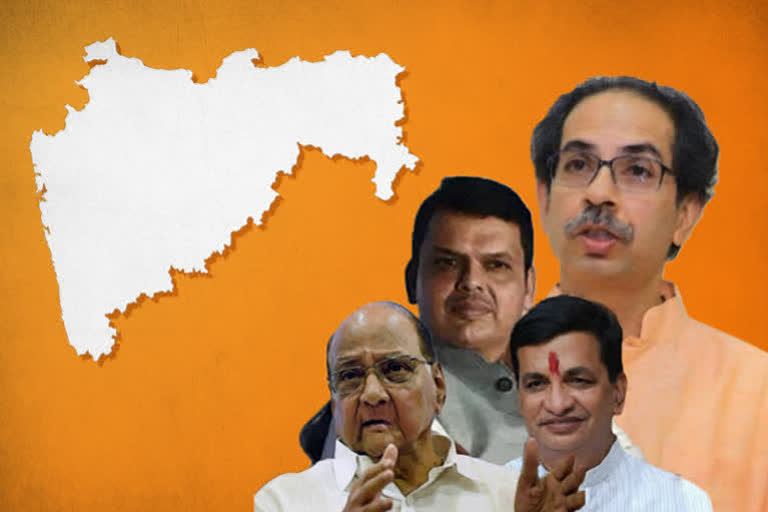Mumbai: The campaign for the Maharashtra assembly elections dominated by the aggressive narrative of nullification of Article 370 by the BJP, which is seeking a second straight term under Chief Minister Devendra Fadnavis, came to end on Saturday evening.
From Opposition's perspective, it was perhaps the most lacklustre canvassing with the exception of a few rallies addressed by Rahul Gandhi who highlighted issues like the economic slowdown, unemployment, "failure" of demonetisation exercise and GST rollout.
On the other hand, Prime Minister Narendra Modi and top BJP brass of the BJP, including Union ministers, raised Article 370 and Opposition's "objection" to withdraw the special status of Jammu and Kashmir.
The PM also spoke about "corrupt" leadership of the Opposition.
For its part, the Opposition camp raised the issues of economic slowdown and joblessness but appeared lacking in projecting itself as a strong alternative to the BJP narrative.
The main contest lies between the "Mahayuti" or grand alliance led by the BJP and the "maha-aghadi" (front) led by the Congress and the NCP.
The bypoll for Satara Lok Sabha constituency will also be held on October 21. Former NCP leader and sitting MP Udayanraje Bhosale is in the fray from the seat on a BJP ticket against Shriniwas Patil of the Congress-NCP combine.
Maharashtra has a total of 8,98,39,600 voters, including 4,28,43,635 women and 4,68,75,750 men, who are expected to exercise their franchise on October 21 to elect 288 out of total 3237 candidates, including 235 women, in the fray.
A total of 1,06,76,013 are voters fall in the age group of 18-25 years.
The BJP is contesting 164 seats, which include candidates of smaller allies contesting on its lotus symbol, while Sena has fielded candidates on 126 seats.
On the other hand, the Congress has fielded 147 candidates and the ally NCP 121.
Among other parties, the Maharashtra Navnirman Sena (MNS), led by Raj Thackeray, has fielded 101 candidates, the CPI 16, the CPM 8. The BSP has fielded candidates in 262 constituencies. A total of 1400 Independents are also in the poll arena.
The campaign is marked by personal attacks and sharp exchange of barbs between the chief minister and NCP chief Sharad Pawar.
For the Opposition, Pawar seemed to be the only saving grace who hit the hustings at the age of 79 and addressed a number of rallies in which he attacked PM Modi and BJP on a string of issues.
However, the Congress and NCP failed to hold even a single joint rally in contrast to the joint rally held by the prime minister and Shiv Sena president Uddhav Thackeray in Mumbai on October 18.
While Modi addressed nine rallies across the state, Rahul Gandhi spoke at six public meetings.
In his speeches, Modi dared the Opposition to bring back provisions of the now scrapped Article 370 in their election manifesto. He also hinted at continued action against Opposition leaders "who are in jail" in corruption cases.
The BJP also sought to subtly raise the Hindutva narrative when the Maharashtra unit of the party raised the demand for conferring the Bharat Ratna for Hindutva icon Vinayak Damodar Savarkar in its manifesto.
The raising of the Bharat Ratna honour and Article 370 forced the Congress to nuance its position on both the issues, with former prime minister Manmohan Singh clarifying that the Congress was not against scrapping of special status of Jammu and Kashmir. He also said the Congress was not against Savarkar per se, but the Hindutva ideology.
The elections are also marked by an undertone of jostling for supremacy between the BJP and the Sena.
On the last day of campaign, Fadnavis and Sena leader Aaditya Thackeray held roadshows in their respective constituencies of Nagpur South West and Worli in Mumbai, while Union Home Minister Amit Shah addressed rallies in North Maharashtra. Sharad Pawar held a string of public meetings in Western Maharashtra.
The elections were marked by a largescale dissensions in the rank and file of the BJP as well as the Sena, with many candidates who were denied tickets contesting as Independents.
Prominent candidates in the fray are chief minister Fadnavis and his predecessors from Congress, Ashok Chavan, who is in fray from Bhokar in Nanded district, and Prithviraj Chavan seeking re-election from Karad South in Satara district.
In a first, Yuva Sena chief Aaditya Thackeray, son of Uddhav Thackeray, is contesting from Worli in Mumbai. The 29-year-old is the first Thackeray to make debut in electoral politics.
A total of 6.5 lakh polling staff is roped in for the October 21 voting, for which 96,661 polling booths are being put in place. A total of 1,35,021 VVPAT machines are also installed.
Among the 288 constituencies, the maximum 38 candidates are in the fray from Nanded south seat and the minimum three from Chiplun in Ratnagiri district.
In 2014 elections, the BJP had won the highest 122 seats, Sena 63, the Congress 42 and the NCP 41 seats.
Since then, two by-elections were held due to death of two legislators Krushna Ghoda (Palghar) and Bala Sawant (Bandra east). The Sena managed to retain both the seats.
In the run-up to elections, several legislators of the Congress and the NCP switched sides to the ruling BJP and Sena. Some of them managed to get tickets.
Political observers feel that the outcome of the elections weighs in favour of the BJP which had won a massive mandate in the Lok Sabha elections, held earlier this year.
BJP leaders are claiming that the NDA alliance would win 222 of the 288 Assembly seats.
Also Read: EC announces holiday for polling officers in Punjab on Oct 22



